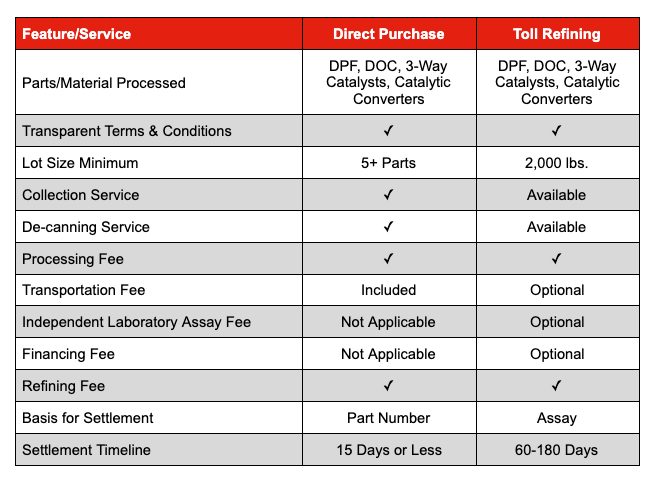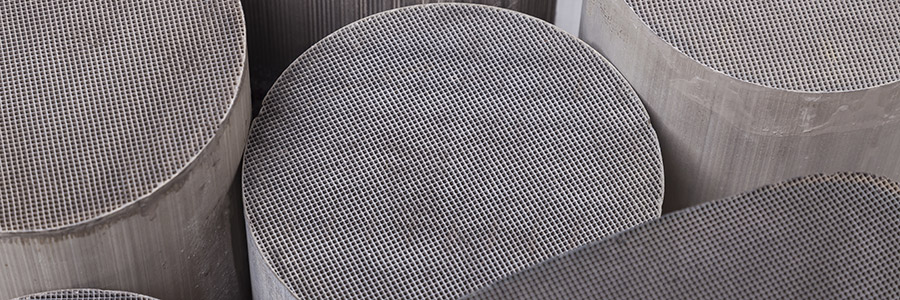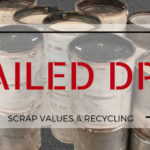With today’s high prices of Platinum Group Metals (PGM), the business of recycling scrap catalytic converters is thriving across the U.S. That said, catalytic converter recyclers are also facing a variety of challenges when it comes to the smelting/refining aspect of their businesses. This article outlines some great solutions to help catalytic converter recyclers streamline their process while maximizing profits.
Quick Takeaways:
- Many scrap catalytic converter recyclers also recycle DPFs (diesel particulate filters) and DOCs (diesel oxidation catalysts)
- PGM smelters/refiners don’t want the lower grade DPF/DOC material in their furnaces
- Diluting your high-grade Catalytic Converter material with lower grade DPF/DOC material can get costly in terms of lower payouts and higher processing fees at the smelter
- Outsourcing your DPF/DOC recycling via direct purchase or toll refining is a good alternative to avoid the added costs of diluted material at the smelter/refiner
What precious metals are found in Catalytic Converters, DPFs and DOCs?
- Catalytic Converters – Scrap catalytic converters have value because they are coated or “catalyzed” with Platinum Group Metals (PGM) such as Platinum (Pt), Palladium (Pd) and/or Rodium (Rd). Because the PGM content in Catalytic Converters is higher and often includes Rhodium, this material is considered higher grade by the smelter/refiner.
- DPFs/DOCs – Scrap DPFs and DOCs have value because they are coated or “catalyzed” with a small amount of Platinum Group Metals (PGM) such as platinum (Pt) and/or palladium (Pd). Because the PGM content of DPFs/DOCs is lower, this material is considered lower grade by the smelter/refiner.
Do most catalytic converters recyclers also recycle DPFs and DOCs?
Yes. As a convenience to their scrap catalytic converter suppliers, many recyclers also buy DPFs and DOCs. As a result, they need a smelter to process the high-grade catalytic converter material along with the lower grade DPF/DOC material. However, most smelters don’t want the lower grade DPF/DOC material and as a result charge higher fees impacting payouts, plus higher processing fees.
Why is combining lower grade DPF/DOC material with high-grade catalytic converter material at the smelter/refiner, not a good idea?
Lower-grade material costs more to process and is less profitable because it has less PGM content. The lower grade material derived from DPFs/DOCs also contains carbon that can cause excessive heat (i.e. overheating) in smelter furnaces. Additionally, new substrate materials found in DPFs/DOCs (i.e. aluminum titanate, cordierite, silicon carbide) are more difficult to process and are not well suited for smelter furnaces.
What drives the challenges of smelting/refining catalytic converters?
It’s a matter of supply and demand. The amount of a commodity, product, or service available and the desire of buyers for it, are the factors regulating its price. Today there is more PGM material for recycling than there is capacity at the smelters. Therefore, smelters are picking who they want to work with and they prefer recyclers with high-grade material (i.e. catalytic converters) that is easier to process and more profitable. Conversely, smelters are penalizing customers with lower-grade material (i.e. material diluted with DPF/DOC content) via higher processing fees and lower payouts. In a nutshell, smelters want high-quality material with higher PGM content because it’s more profitable and easier to process.
What are the best options for processing DPF/DOC material by a Catalytic Converter Recycler?
To protect payout rates and minimize processing fees at the smelter/refiner, many Catalytic Converter Recyclers are using one of two methods to separately process (i.e. recycle) their DPF/DOC material. This means you work with a provider that specializes in DPF/DOC recycling under one of two types of agreements.
Direct Purchase Agreement
- DPF/DOC part numbers and PGM content are well known
- Payouts are part number driven and payment is prompt (15 days or less)
- The payout process is more liquid and happens quickly
- Fees typically include Processing, Transportation, and Refining
Toll Refining Agreement
- Toll refining is defined as a situation in which the owner of PGM material contracts the refining of the metal to another party for a fee, but the refined material remains under the original owner until final sale or disposition.
- Used only for large bulk lots (2,000+ lbs) with little part number level PGM knowledge
- Payouts are based on the actual assay of the crushed material and payment is slower (60 or 180 days) due to a more extensive process
- This purchase method is less liquid (payment in ~60 or ~180 days)
- Typical fees include Processing (decanning/crushing), Transportation, Assaying/Laboratory Analysis, Financing and Refining
- Companies who wish to manage their own refining of scrap DPF/DOC material can make use of Red Fox Resources’ toll refining expertise, knowing that they advocate on your behalf to obtain the best terms and price at the smelter/refiner
Red Fox Resources is highly regarded by toll refining customers because our approach is highly transparent and dependable.
Red Fox Resources – Direct Purchase vs. Toll Refining

What protections do I have working with Red Fox on Toll Refining?
Many customers ask about the risks or unknowns with Toll Refining. Based on our positive experience with Toll Refining, Red Fox Resources sees a number of protections and assurances for the customer or seller of material in a Toll Refining agreement.
- Refiners work in a competitive environment and therefore must offer competitive payouts
- Material samples are often used for validation via an independent laboratory
- If the assay is in an acceptable range, seller/buyers agree on a mutual buyout price
- If the assay is NOT in an acceptable range, it can go to an independent referee and laboratory to make a determination
- Red Fox is well connected with multiple smelters/refiners willing to process the lower grade DPF/DOC material
- Red Fox proactively advocates on behalf of the PGM material owner
- Red Fox provides a transparent and dependable process
Red Fox Resources has an extensive background in Direct Purchase Agreements and Toll Refining Agreements for recycling scrap DPFs, DOCs, and Three-Way Catalysts used in emission control systems. Although we also recycle Catalytic Converters, our primary expertise is in recycling DPFs, DOCs, and Three-Way Catalysts.
To learn more about Toll Refining with Red Fox Resources, please contact Tripp Heller directly at tripp.heller@redfoxresources.com or 844-733-3695.







